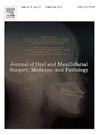Incidence of oral reactions of immune-related adverse events caused by immune checkpoint inhibitors
IF 0.4
Q4 DENTISTRY, ORAL SURGERY & MEDICINE
Journal of Oral and Maxillofacial Surgery Medicine and Pathology
Pub Date : 2025-04-24
DOI:10.1016/j.ajoms.2025.04.011
引用次数: 0
Abstract
Objective
Immune-related adverse events (irAEs) are side effects caused by the persistence of autoantigen-specific T cells in normal cells and organs that are not eliminated after immune checkpoint inhibitors (ICI) administration. Oral irAEs include xerostomia, oral mucositis, and lichen planus-like lesions; however, only a few studies have reported oral irAEs during ICI therapy. This study aimed to examine the incidence of oral irAEs in our hospital and the effect of oral care.
Methods
The study enrolled 165 patients who underwent oral hygiene management during ICI administration, and did not undergo radiotherapy to the head and neck region, and 63 patients (38.2 %) presented with oral mucositis and/or xerostomia, which appears to be oral irAE. Although most of the patients who suffered from these oral reactions were using anti-Programmed cell Death-1 antibodies, severe oral mucositis was observed in patients who treated with multiple ICIs. Symptoms of patients with grade 1 and 2 mucositis were improved with oral care, and ICI were continued in most of them. However, all patients with grade 3 oral mucositis also showed improvement in symptoms, ICI therapy was discontinued in three patients, systemic steroids were administered in two patients, and ICI therapy was not restarted during the study period.
Conclusion
The incidence of oral irAEs is high in patients on ICI therapy, and continuous oral hygiene management by experts appears to be important for continuity of the treatment.
免疫检查点抑制剂引起的免疫相关不良事件的口服反应发生率
目的免疫相关不良事件(irAEs)是免疫检查点抑制剂(ICI)使用后,自身抗原特异性T细胞在正常细胞和器官中持续存在而未被清除所引起的副作用。口腔irae包括口干、口腔黏膜炎和扁平苔藓样病变;然而,只有少数研究报道了在ICI治疗期间口服irAEs。本研究旨在了解我院口腔irAEs的发生率及口腔护理的效果。方法本研究纳入了165例在使用ICI期间接受口腔卫生管理的患者,未进行头颈部放疗,63例(38.2 %)出现口腔黏膜炎和/或口干,这可能是口腔irAE。虽然大多数出现这些口腔反应的患者使用了抗程序性细胞死亡-1抗体,但在接受多次ICIs治疗的患者中观察到严重的口腔黏膜炎。1级和2级粘膜炎患者的症状在口腔护理后得到改善,大多数患者的ICI仍在继续。然而,所有3级口腔黏膜炎患者的症状也有所改善,3例患者停止了ICI治疗,2例患者接受了全身类固醇治疗,并且在研究期间没有重新开始ICI治疗。结论接受ICI治疗的患者口腔irAEs发生率较高,专家的持续口腔卫生管理对治疗的连续性至关重要。
本文章由计算机程序翻译,如有差异,请以英文原文为准。
求助全文
约1分钟内获得全文
求助全文
来源期刊

Journal of Oral and Maxillofacial Surgery Medicine and Pathology
DENTISTRY, ORAL SURGERY & MEDICINE-
CiteScore
0.80
自引率
0.00%
发文量
129
审稿时长
83 days
 求助内容:
求助内容: 应助结果提醒方式:
应助结果提醒方式:


